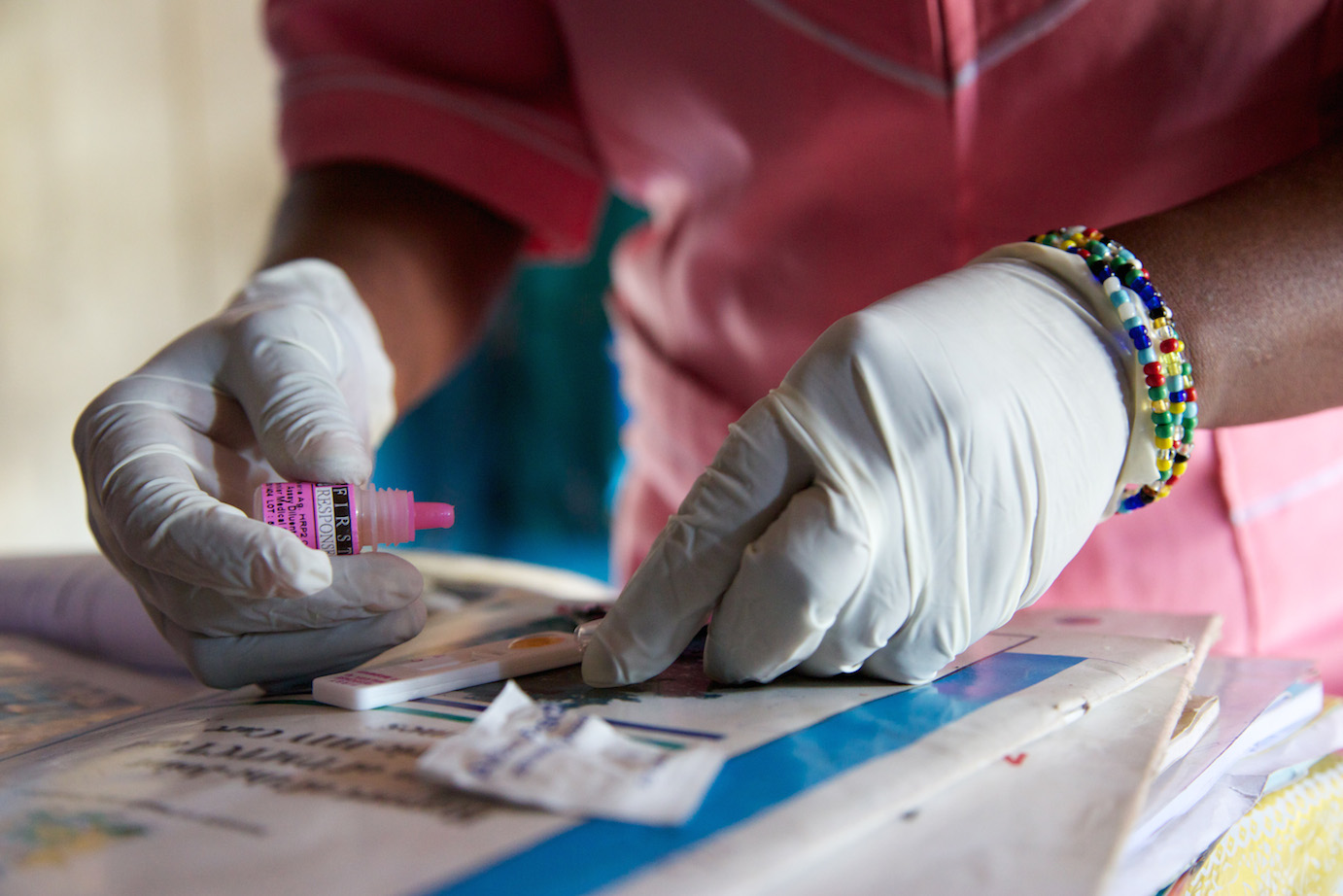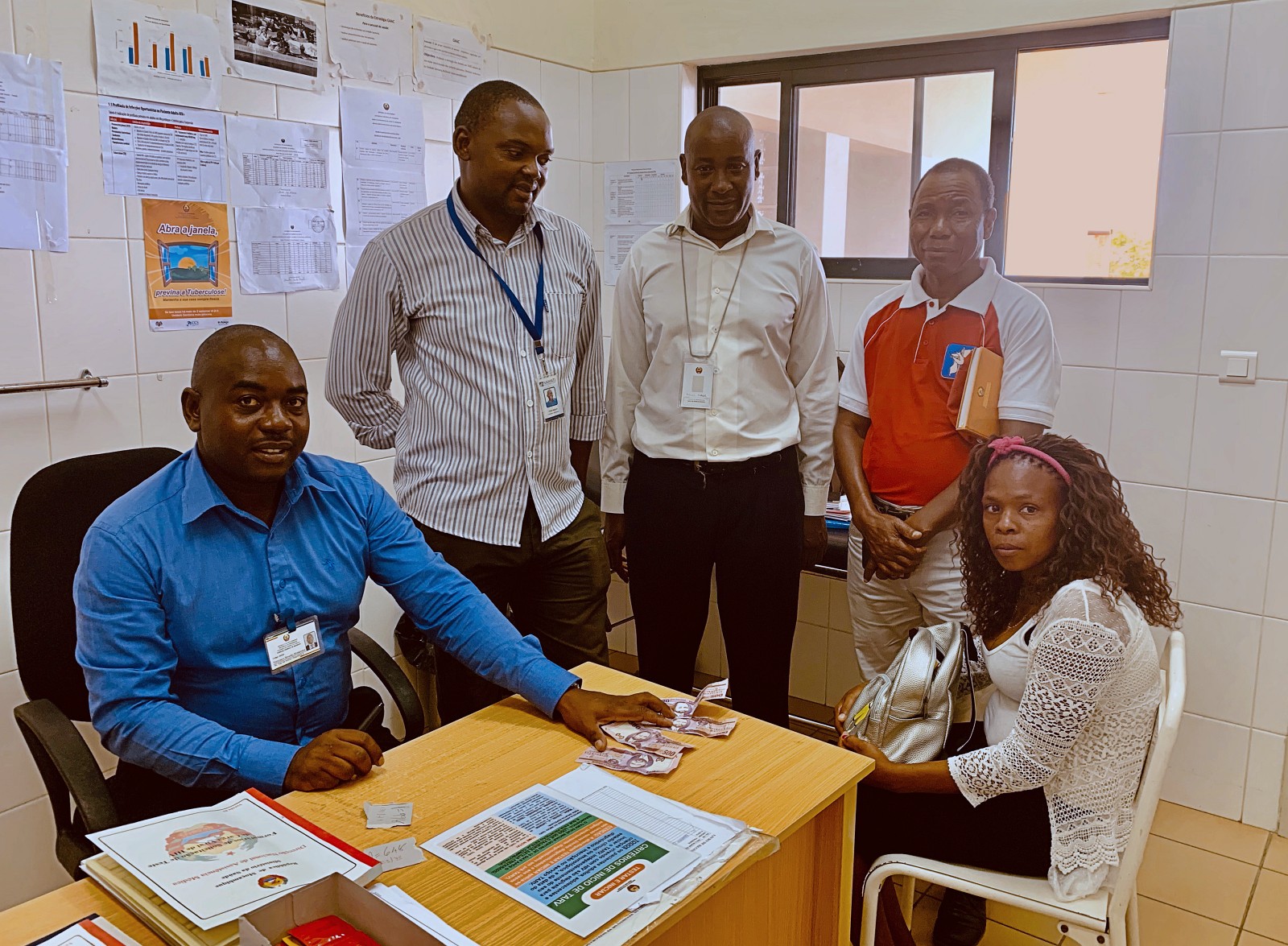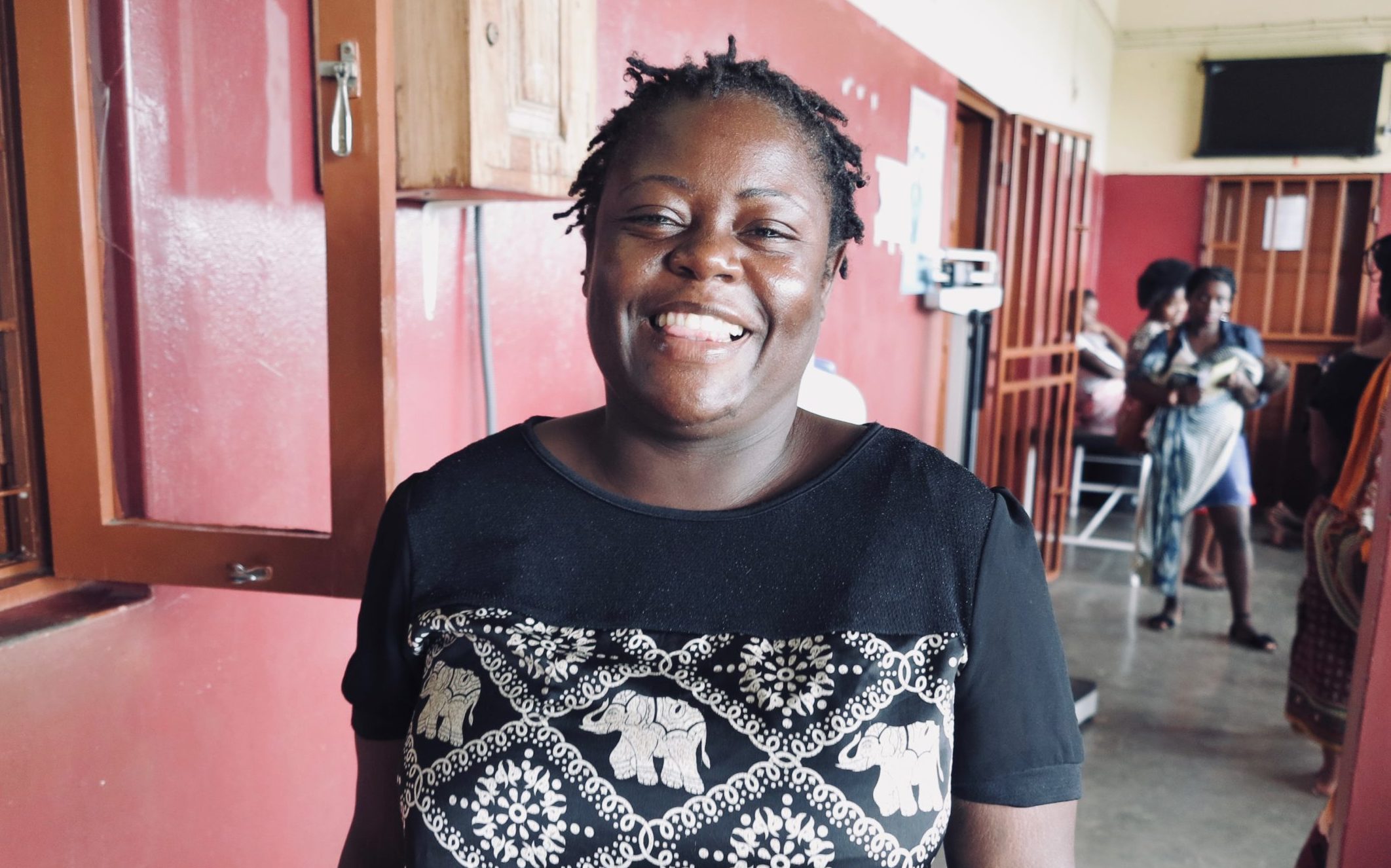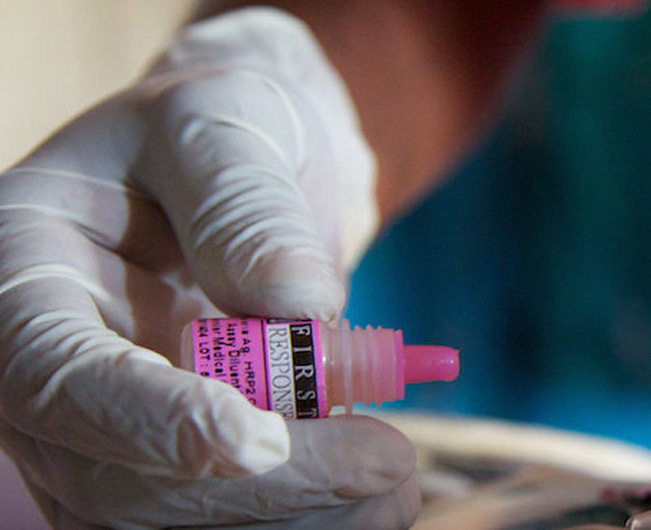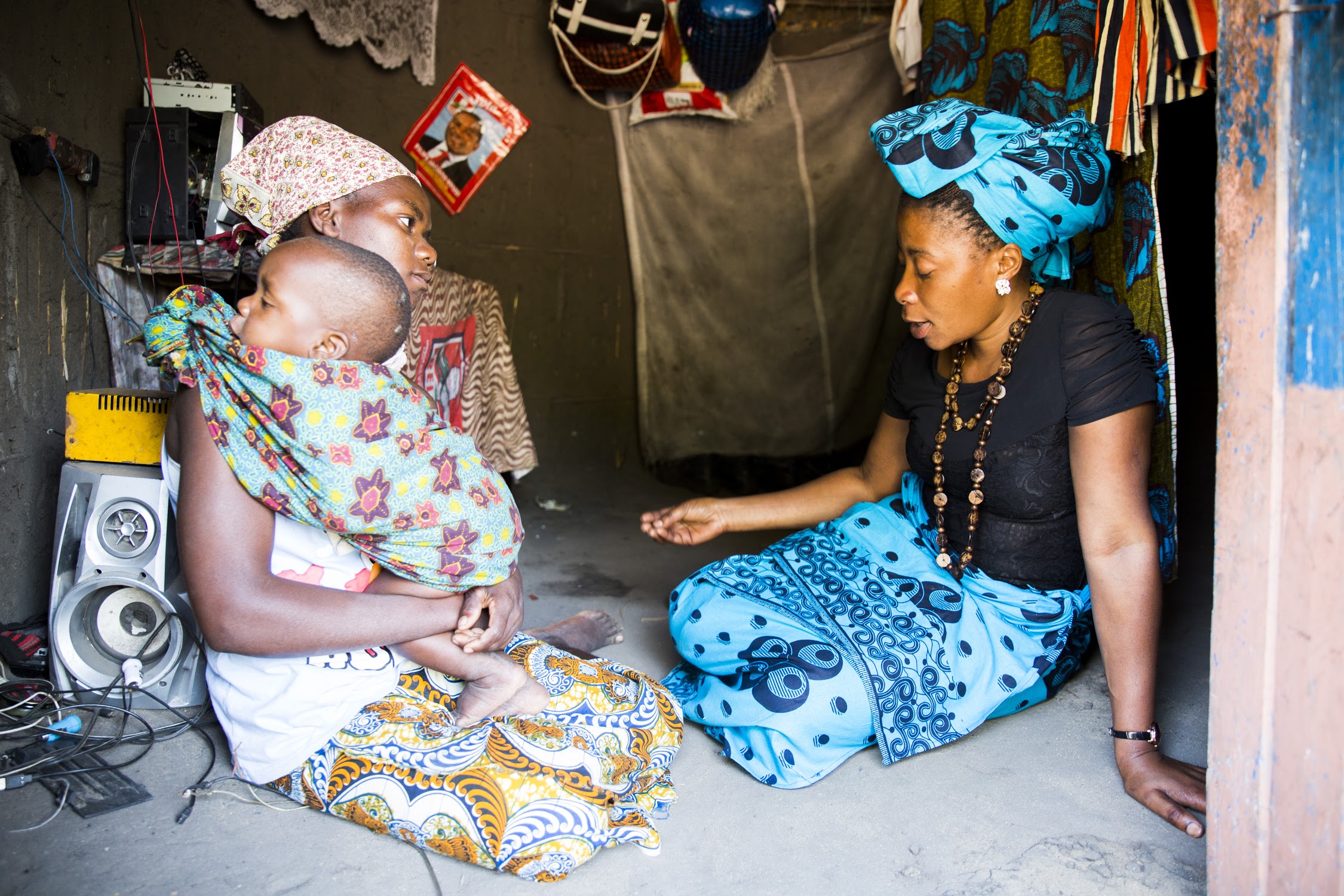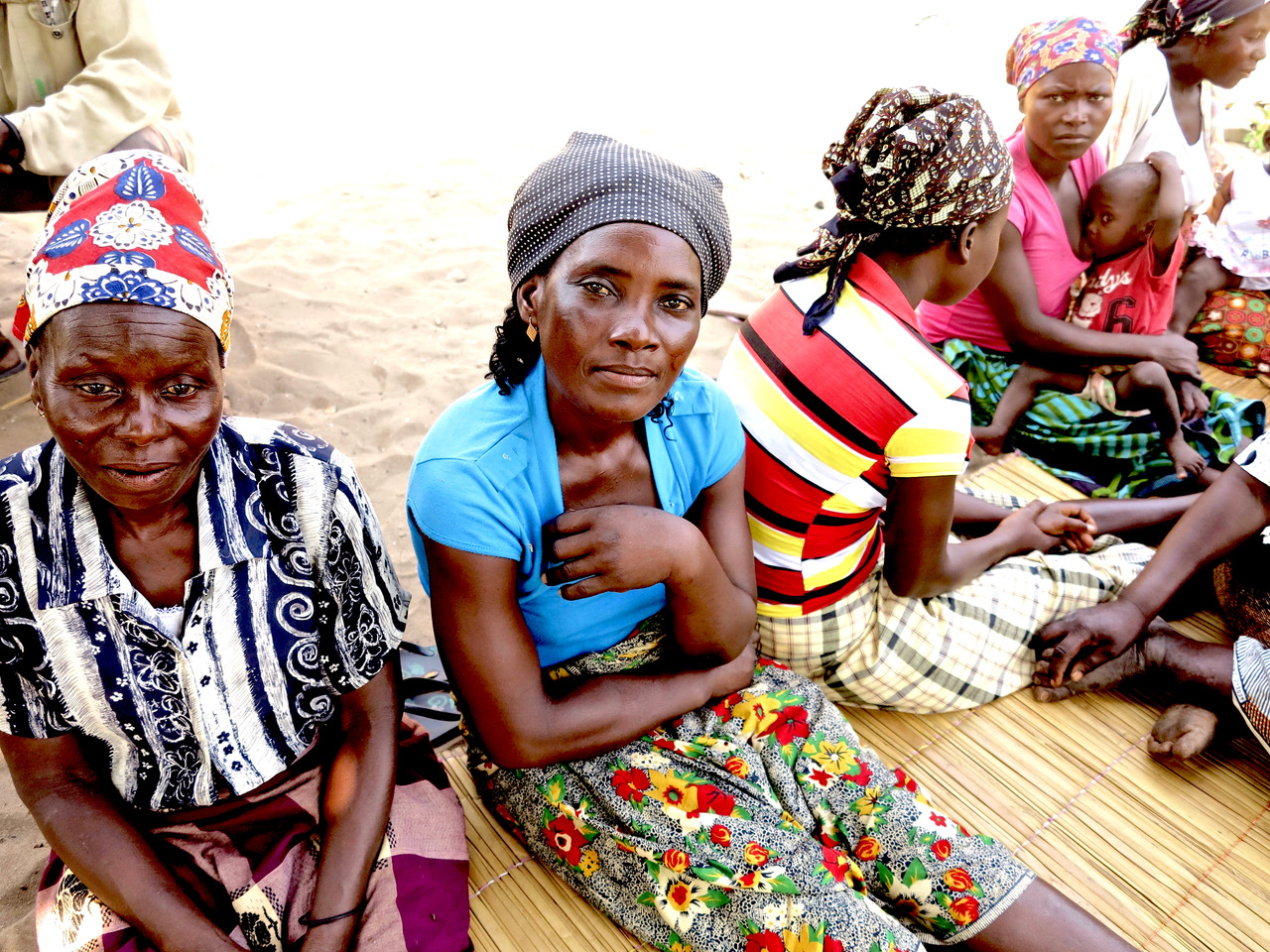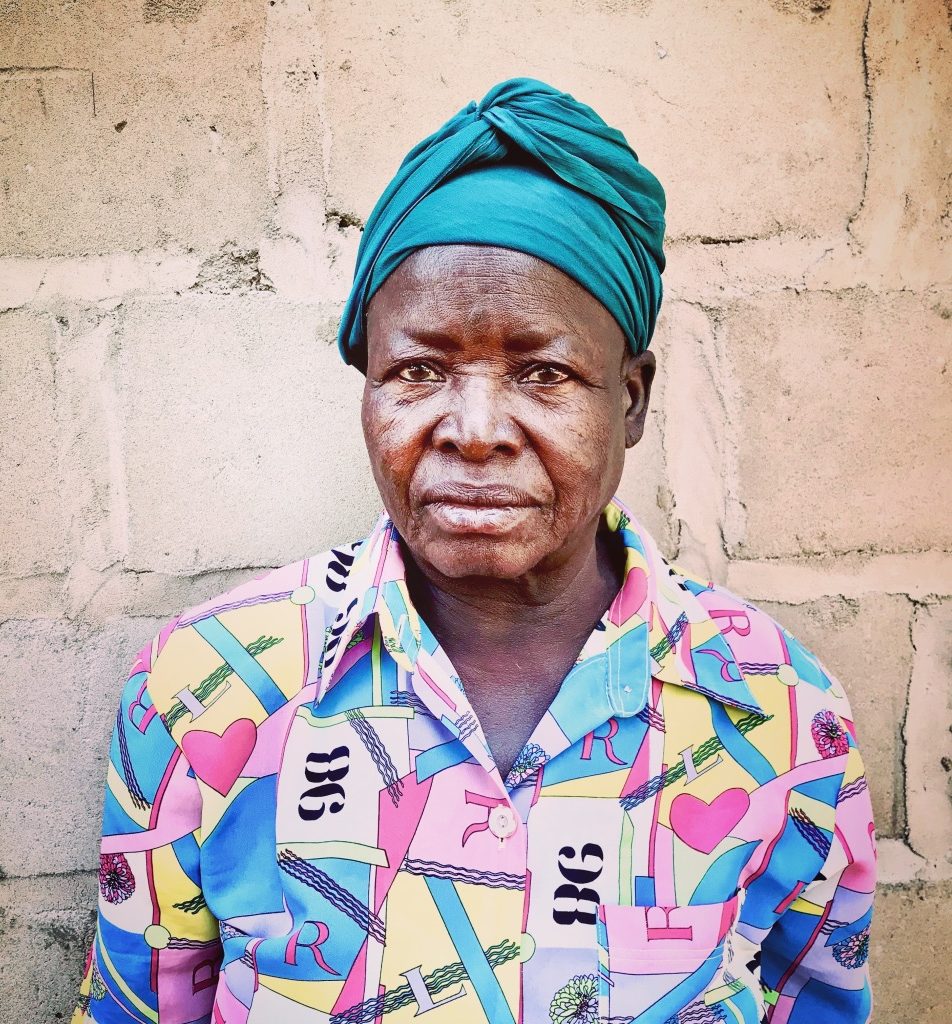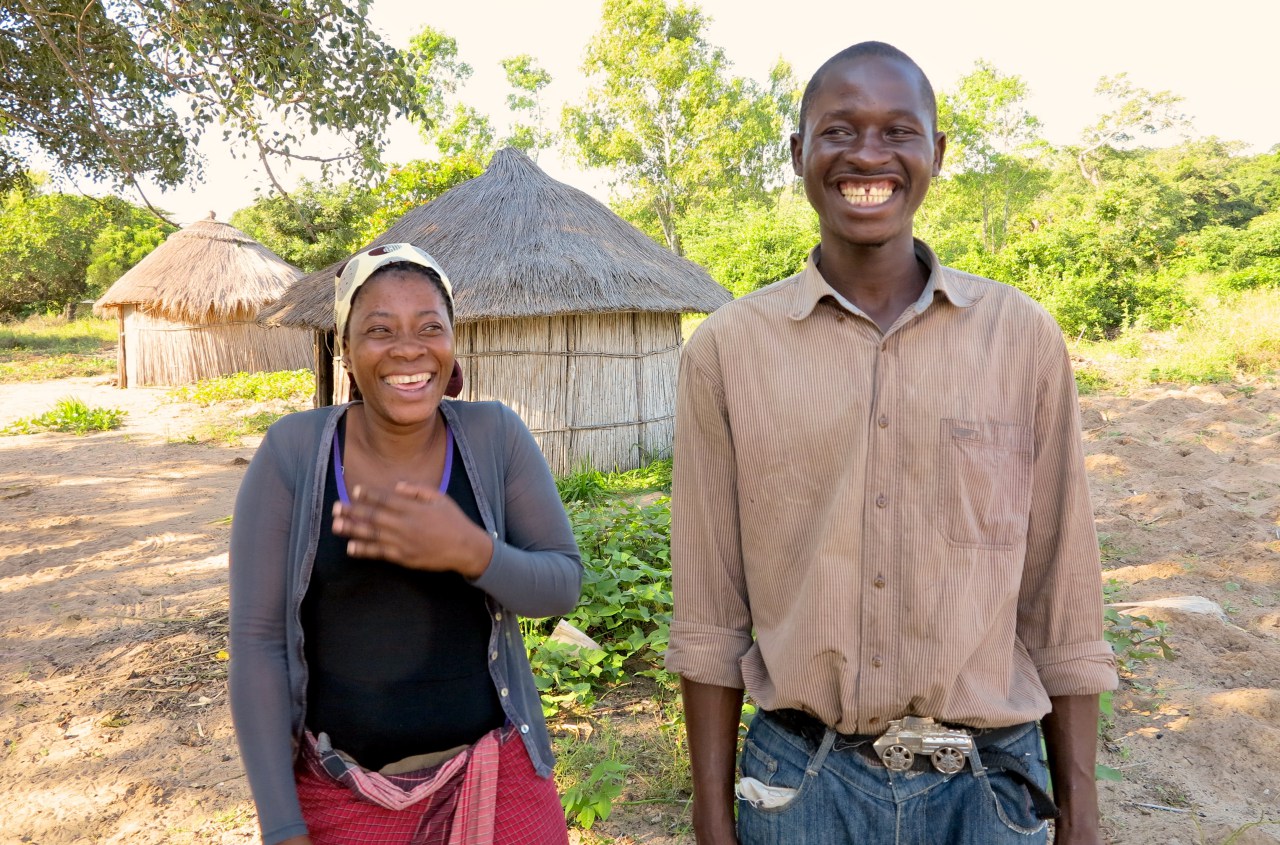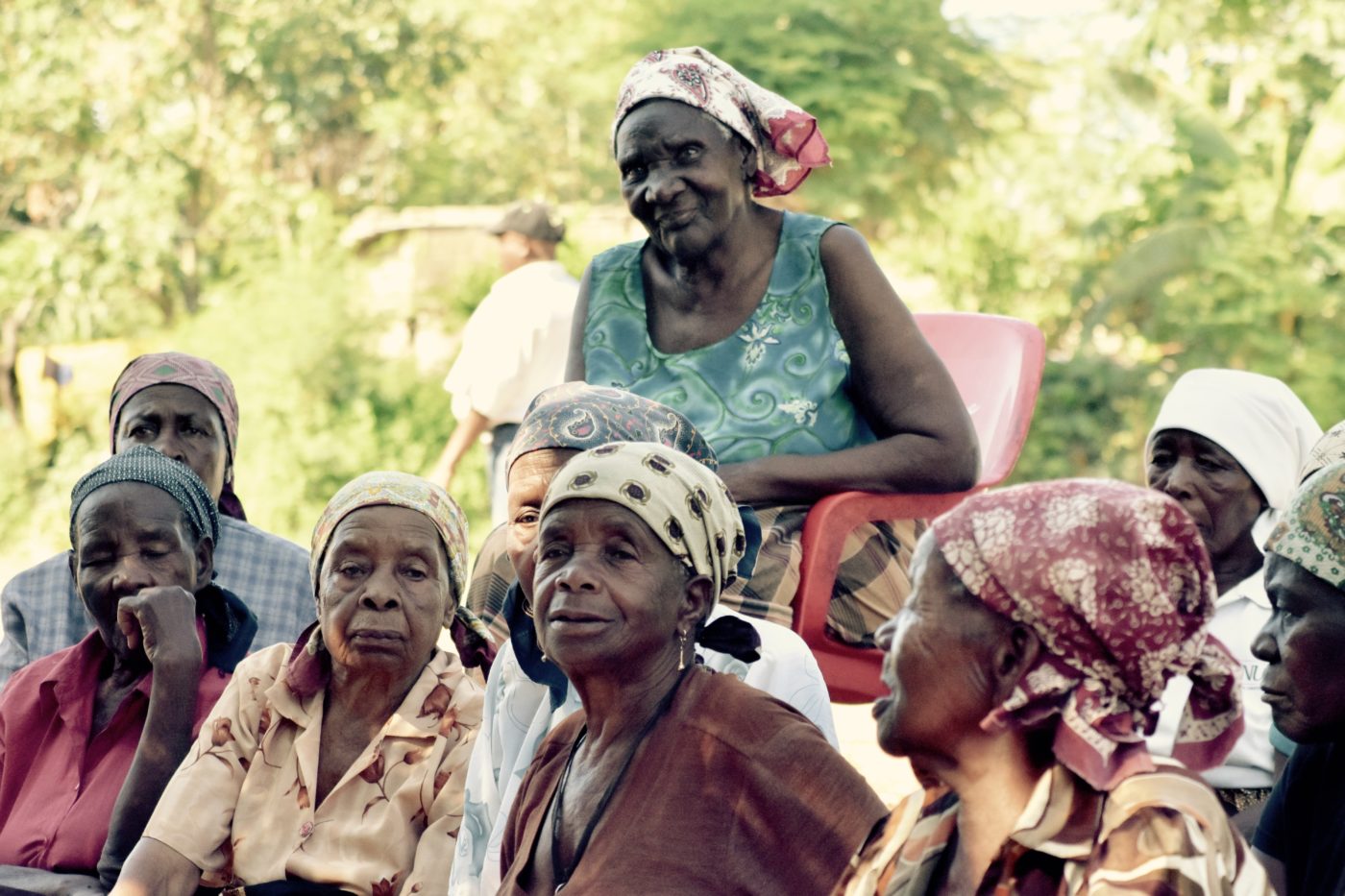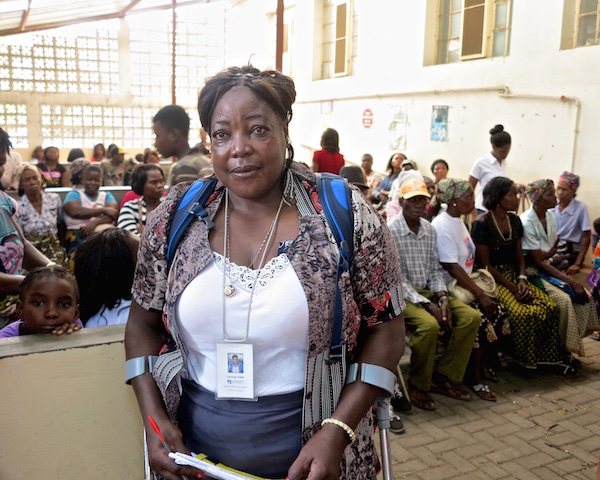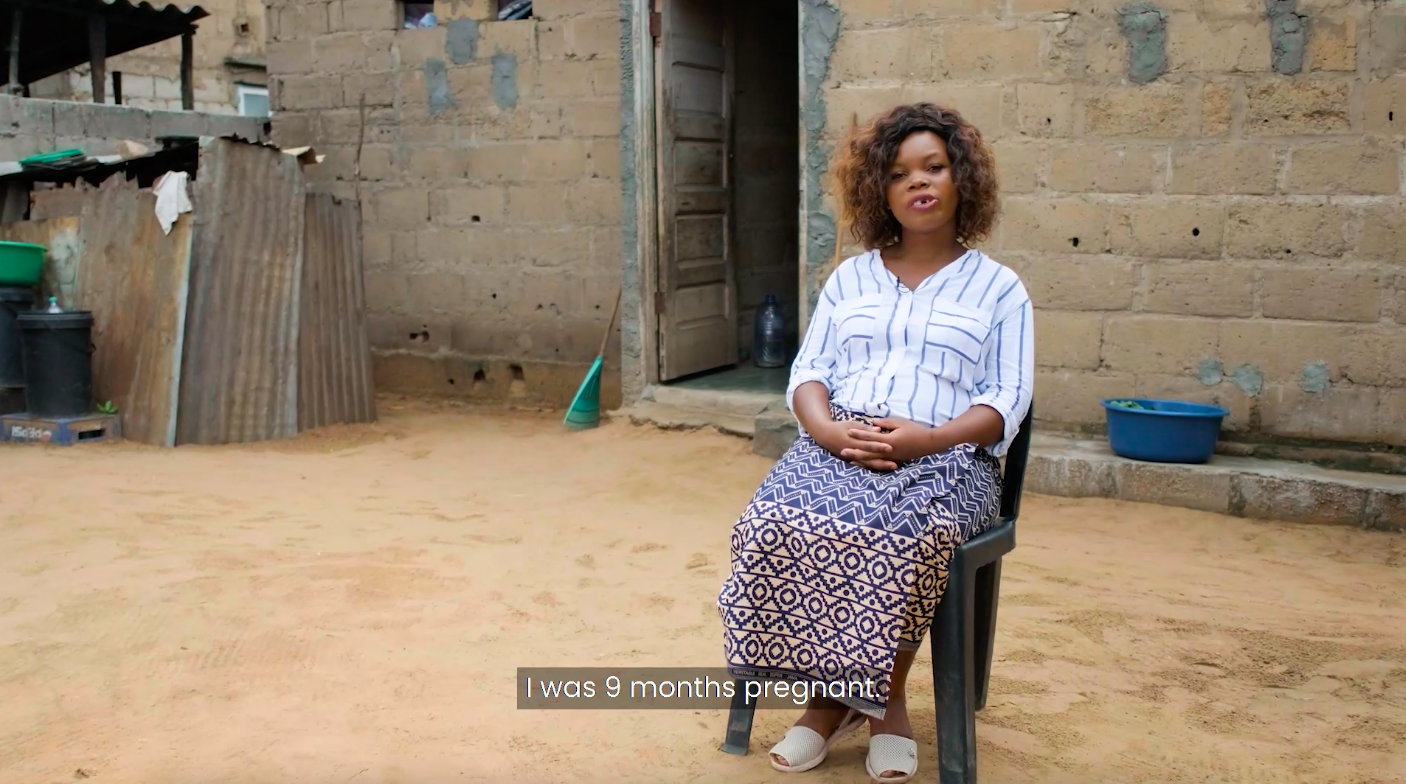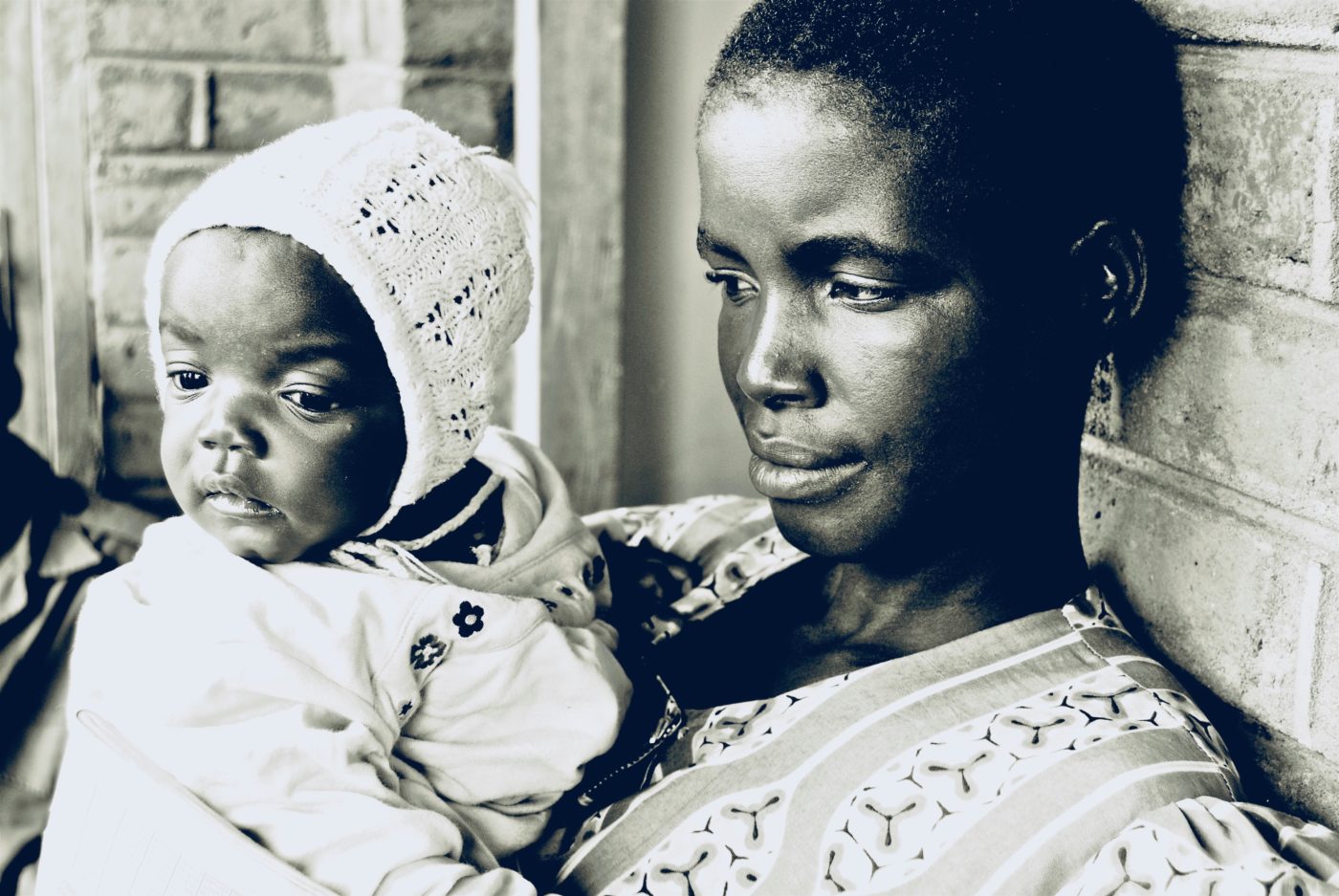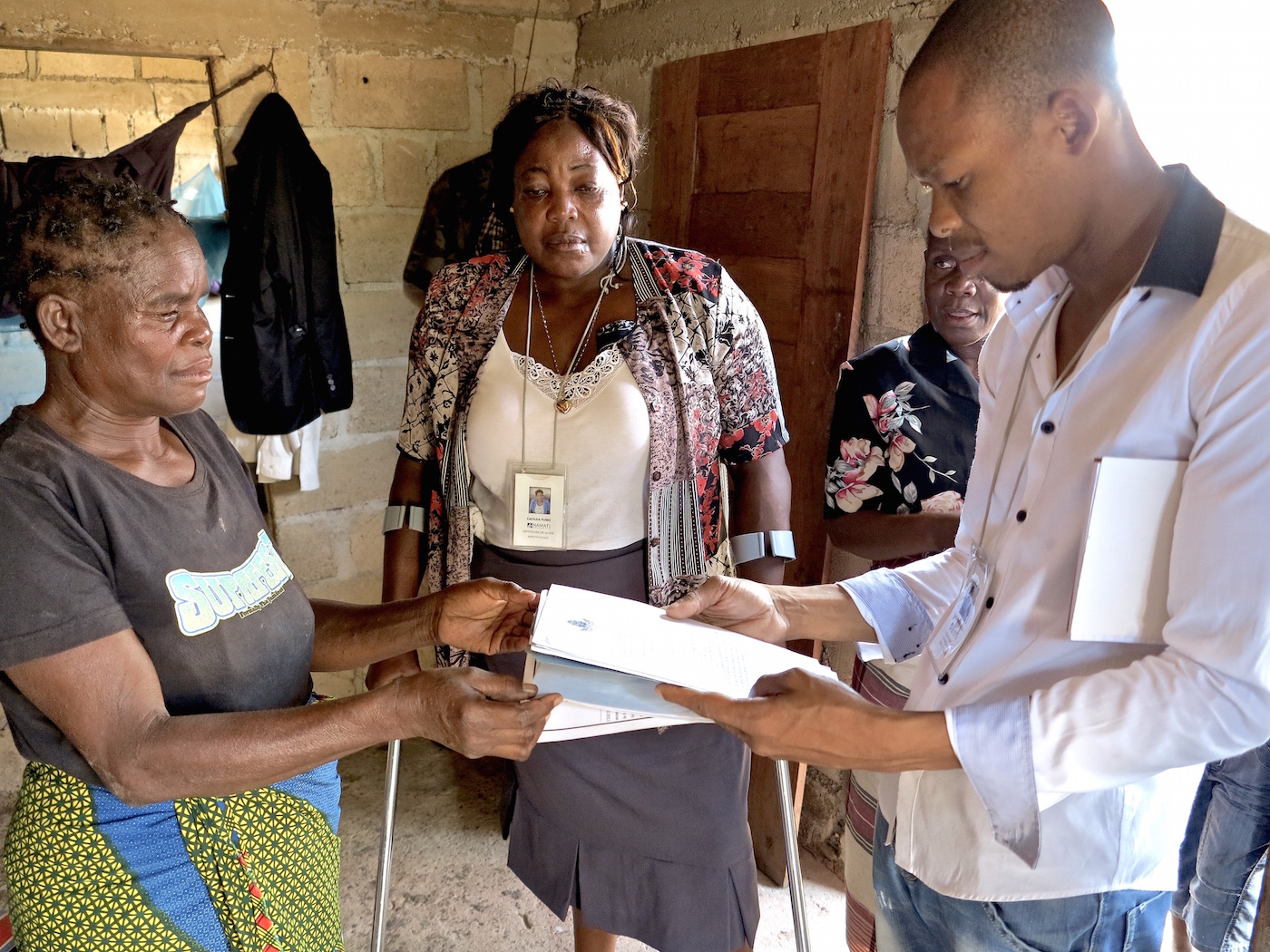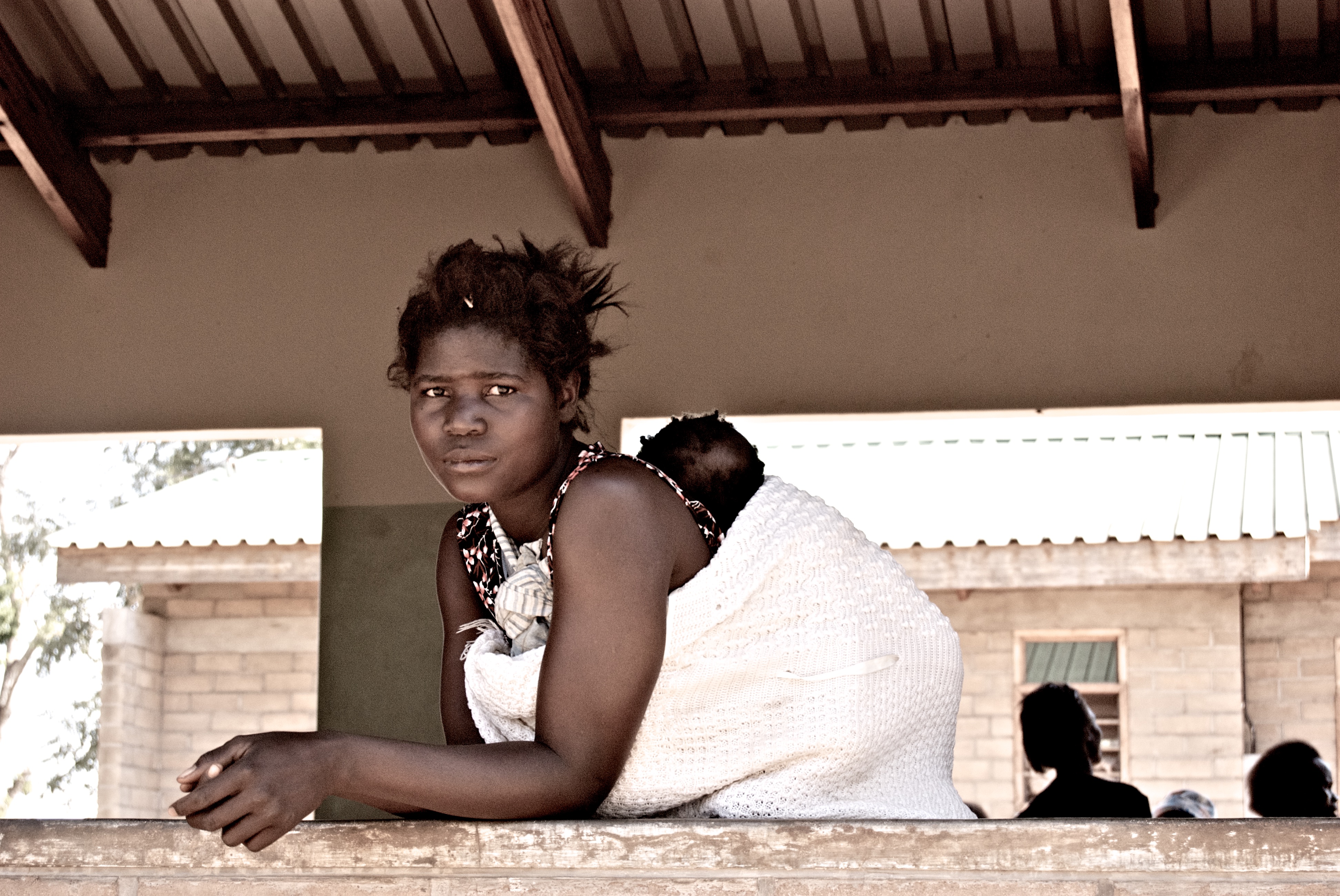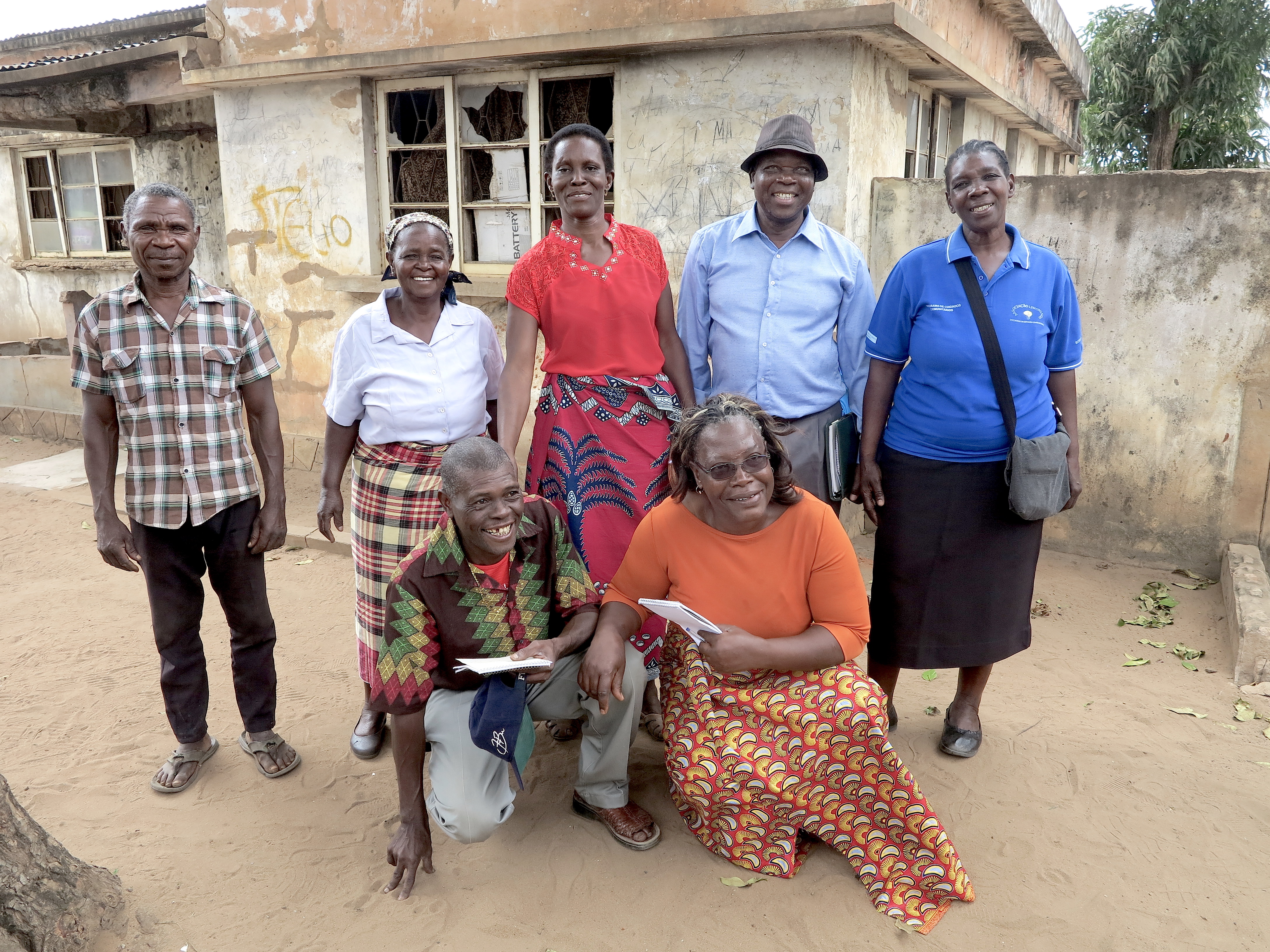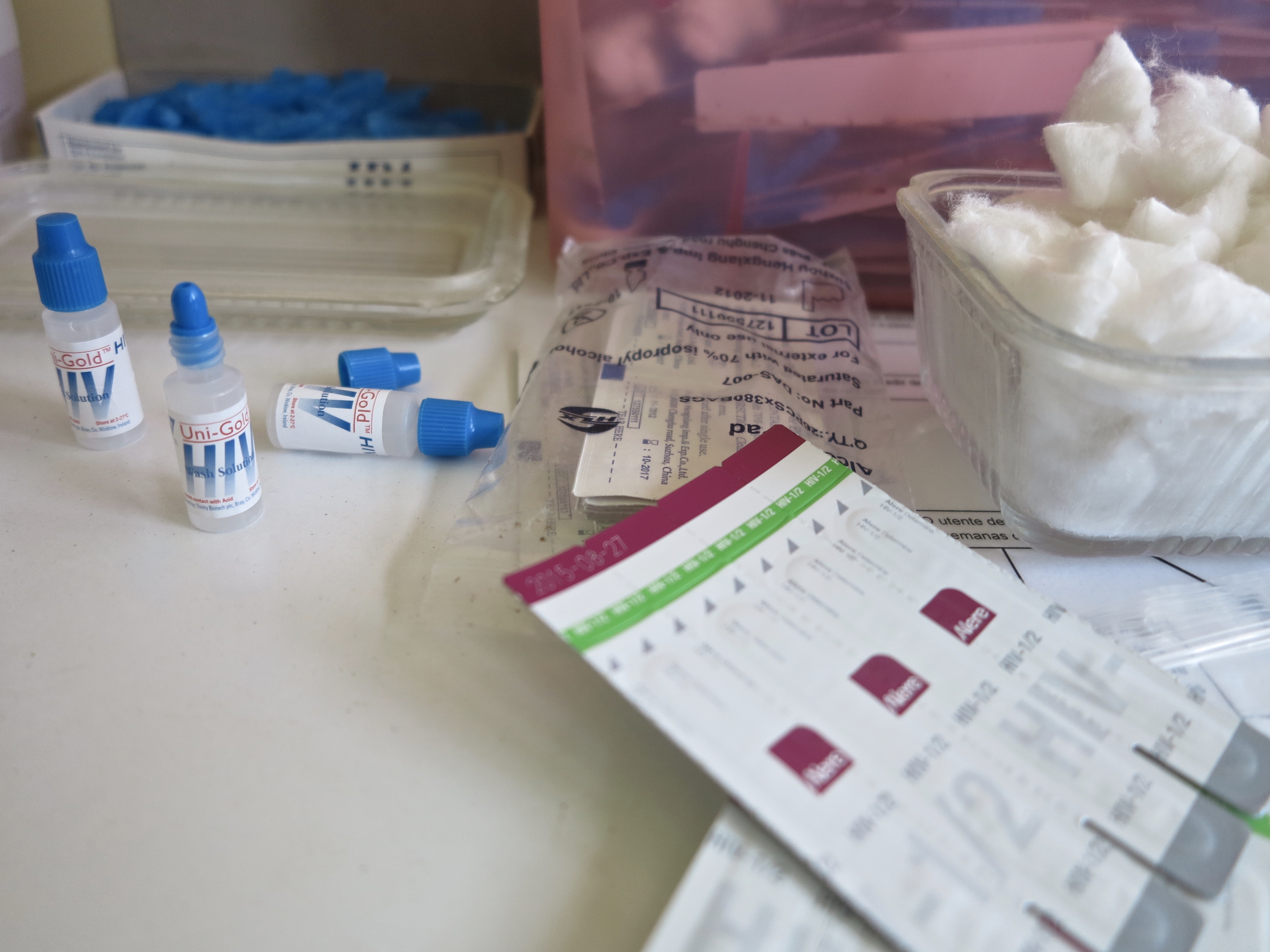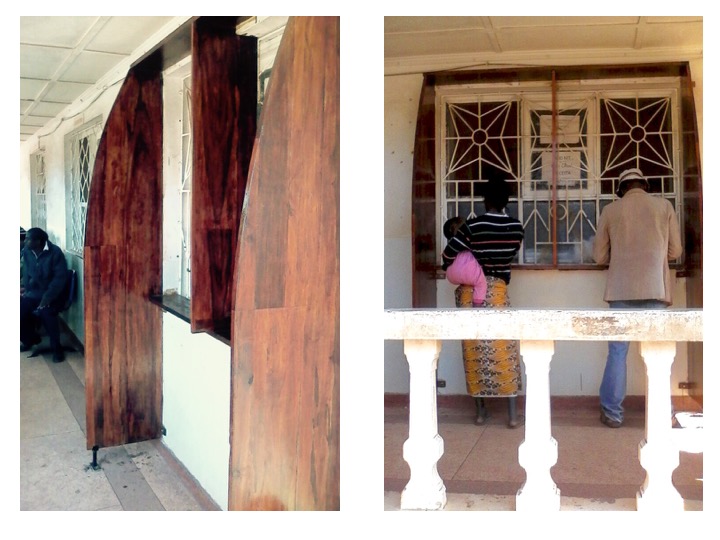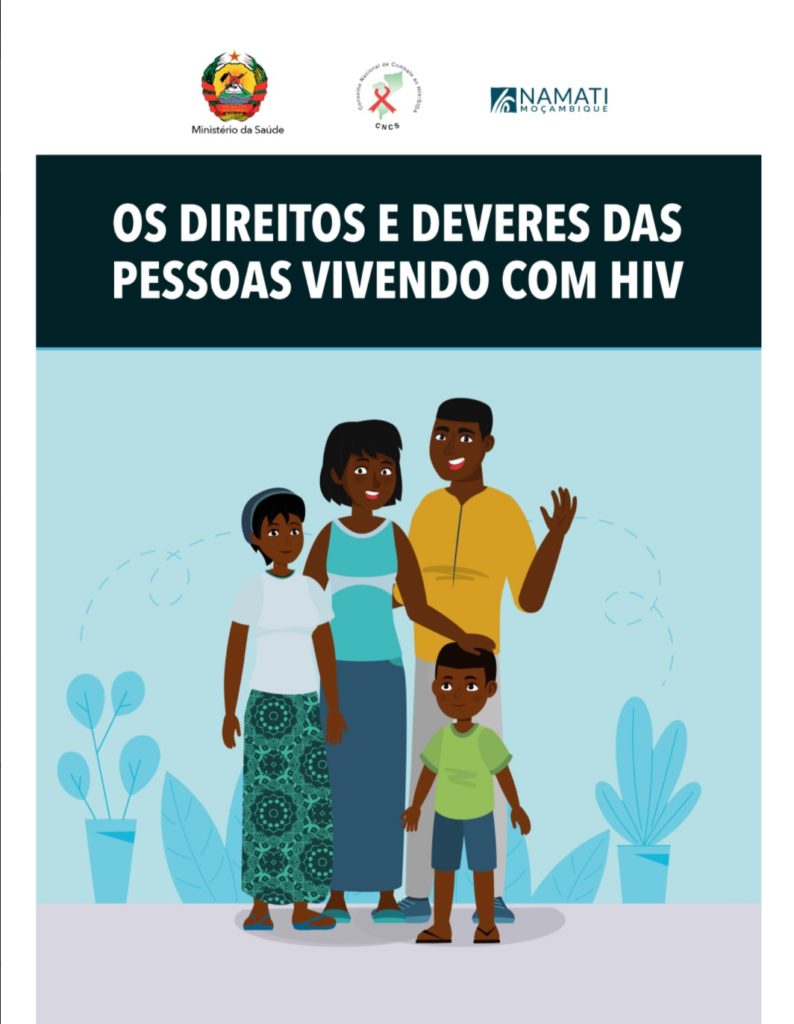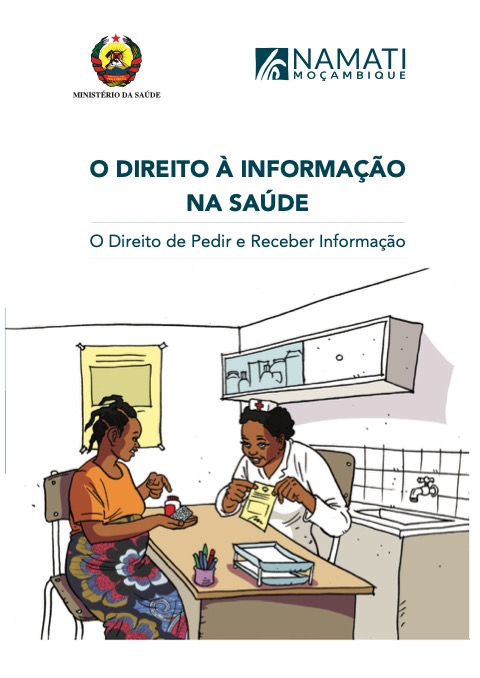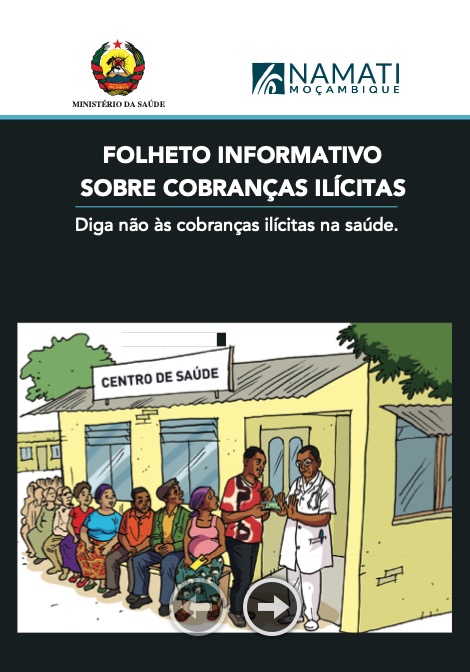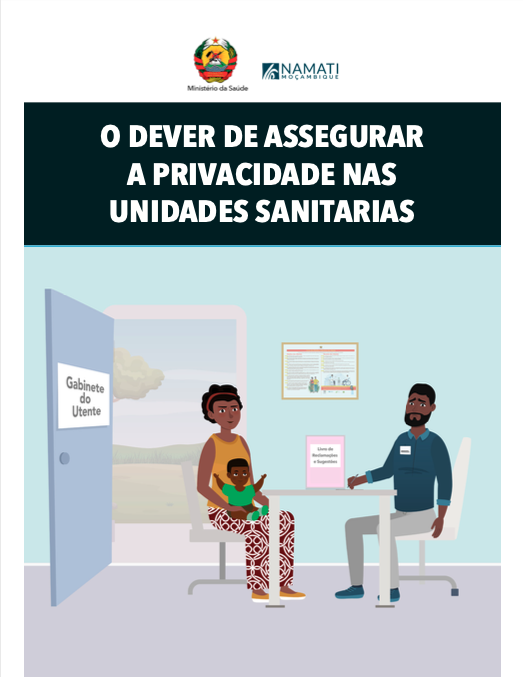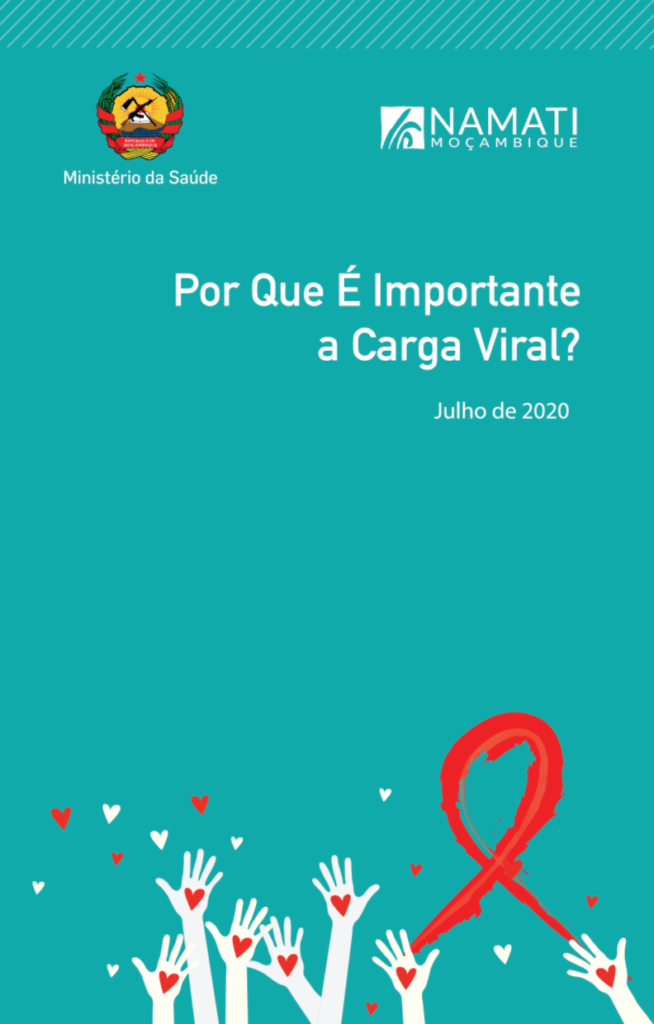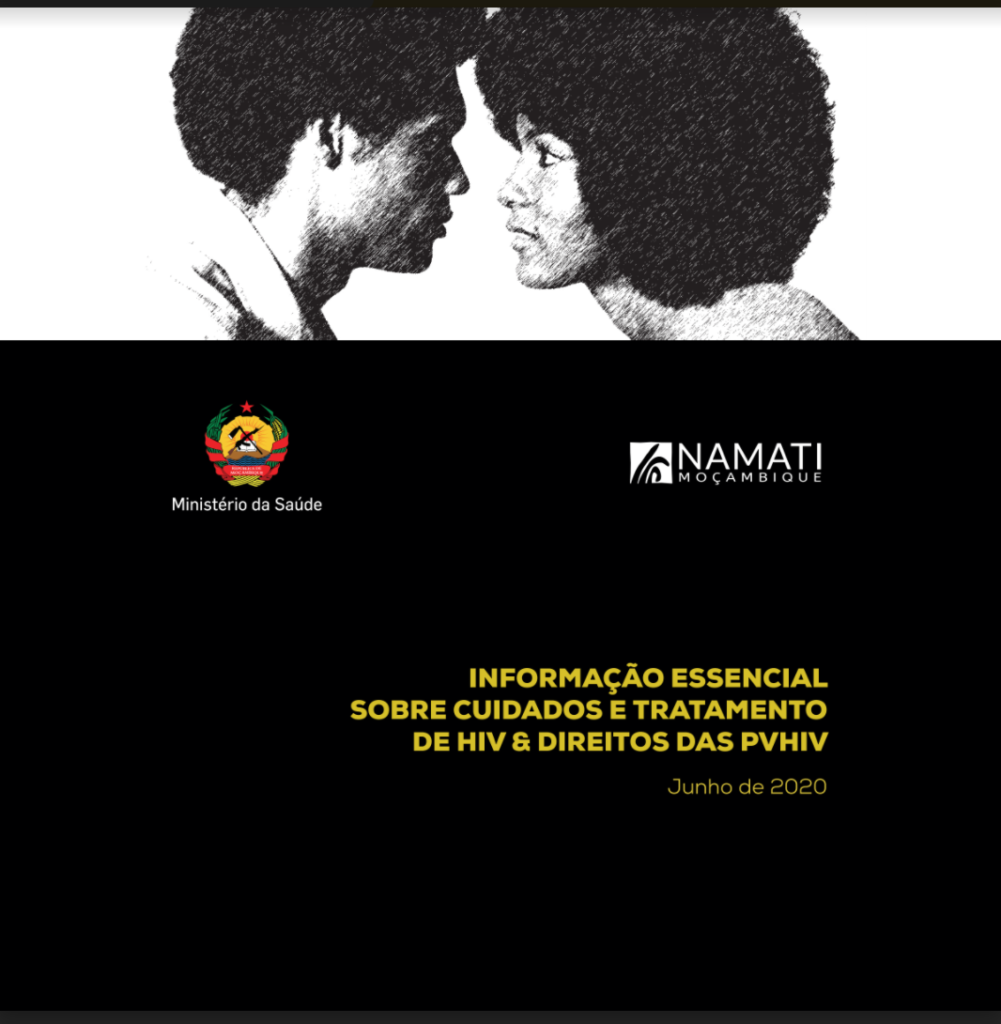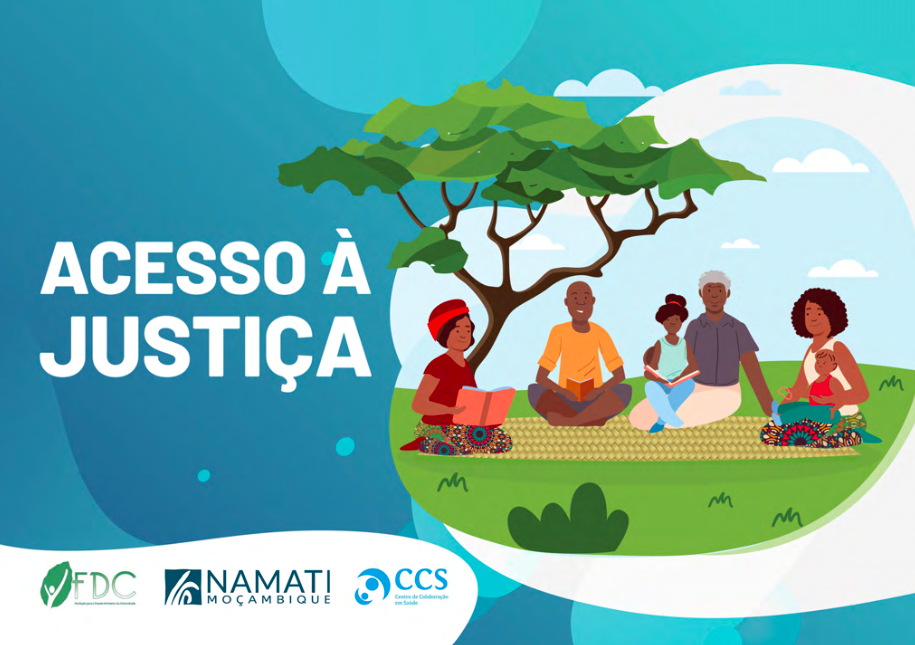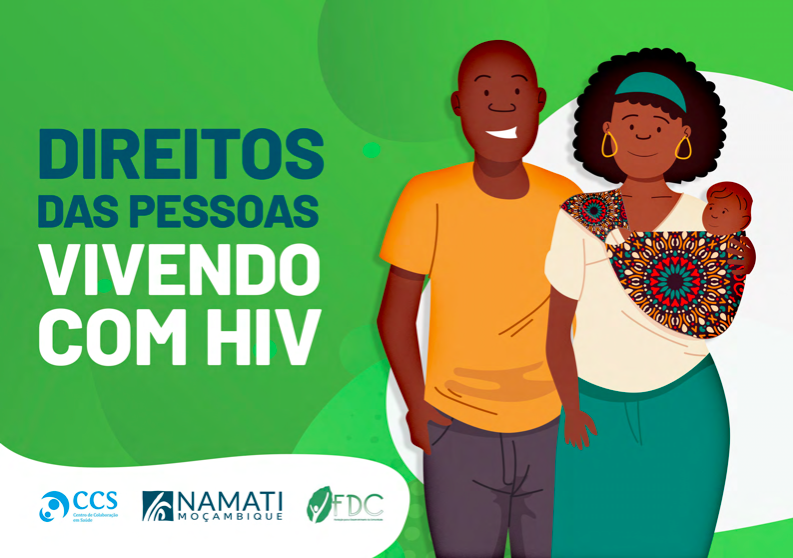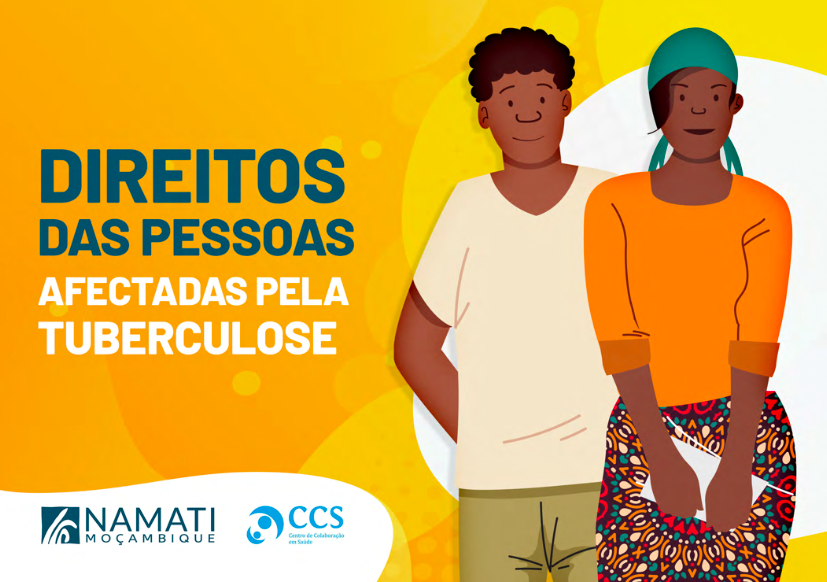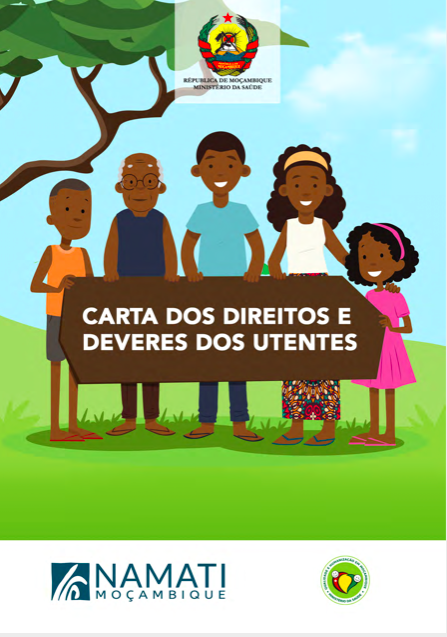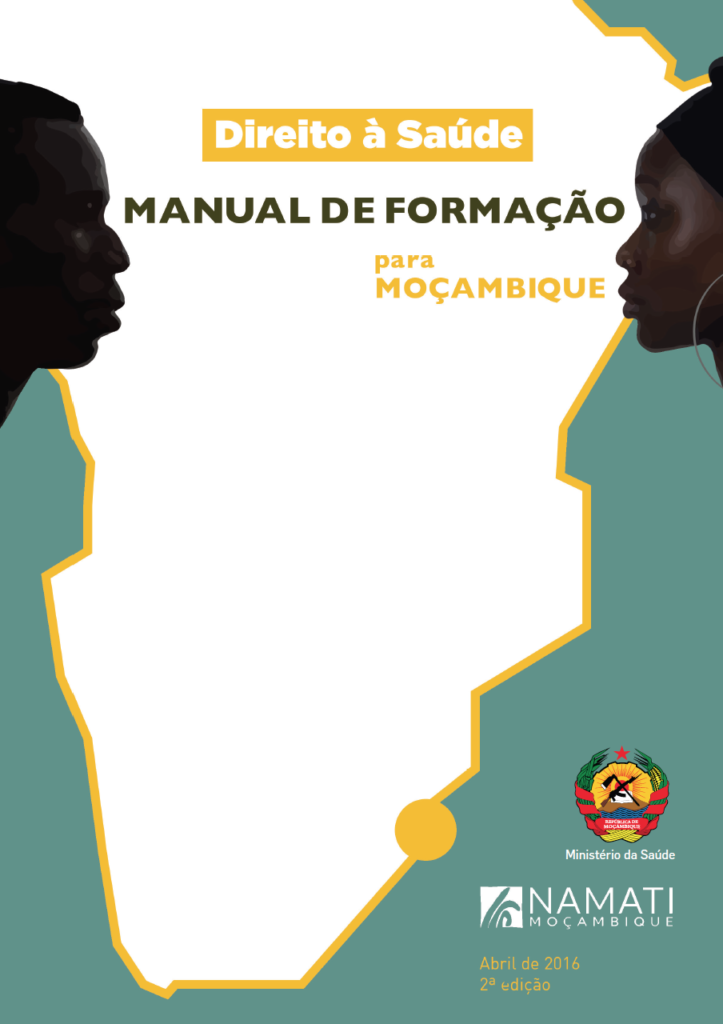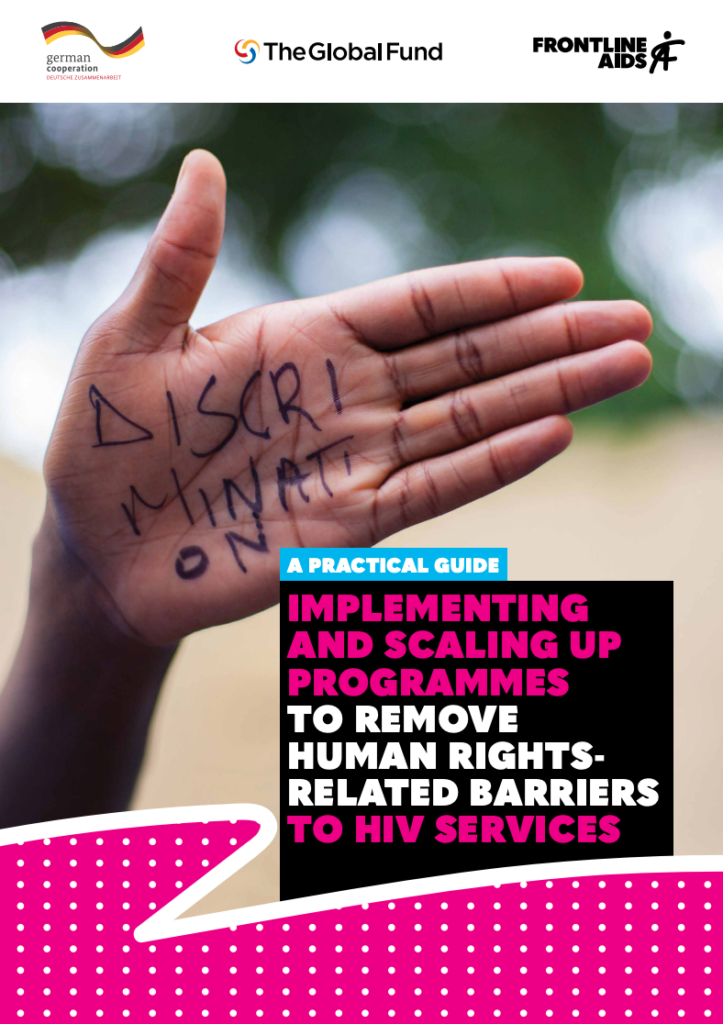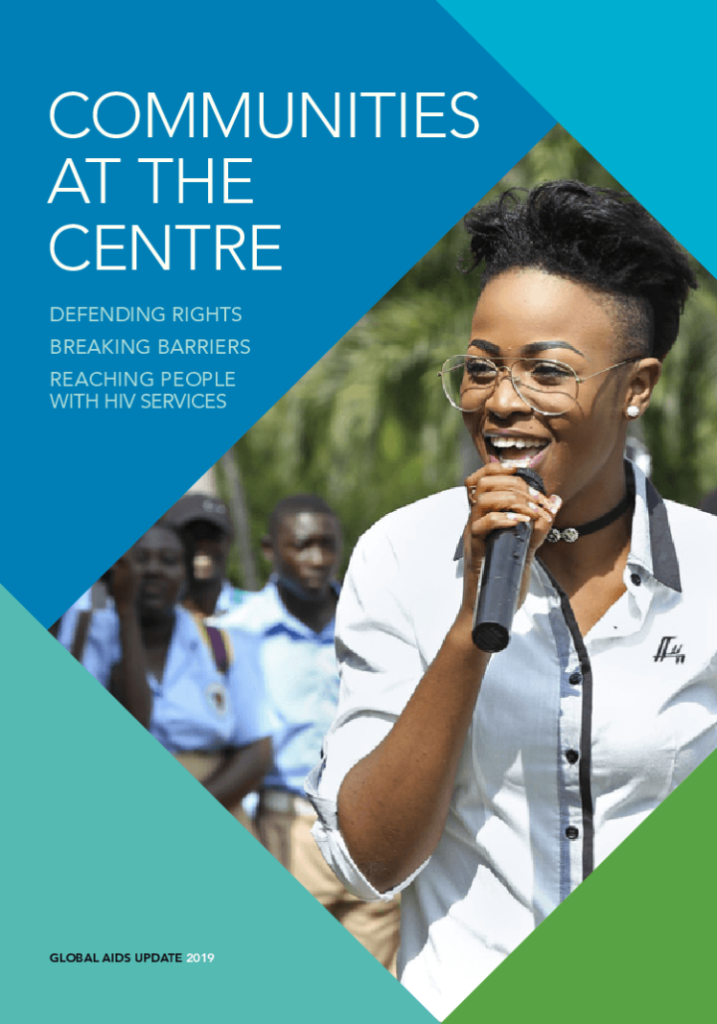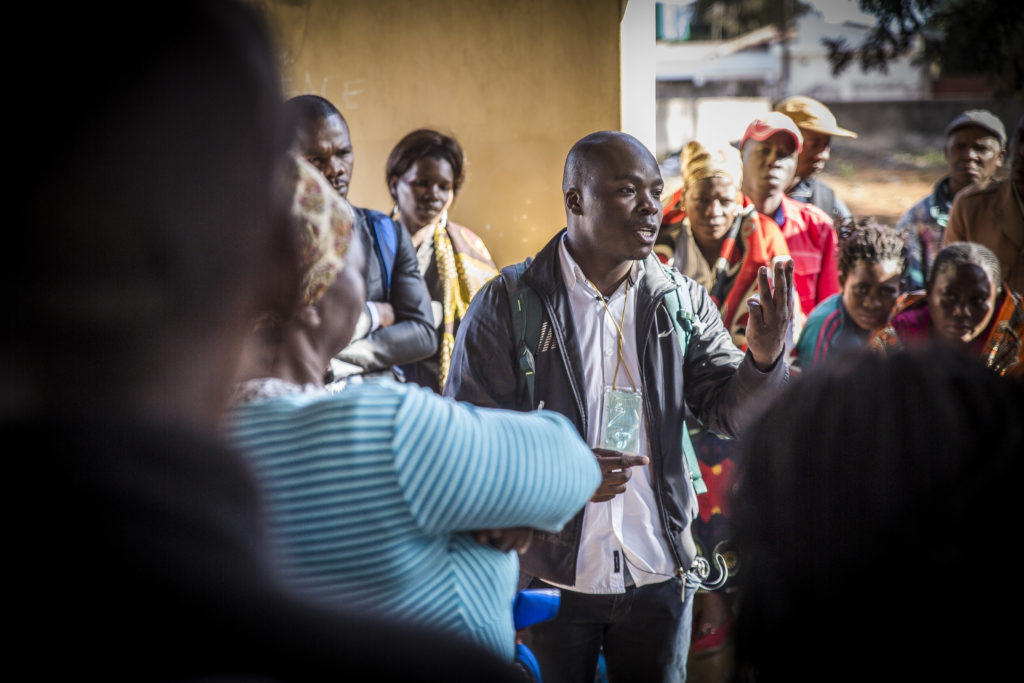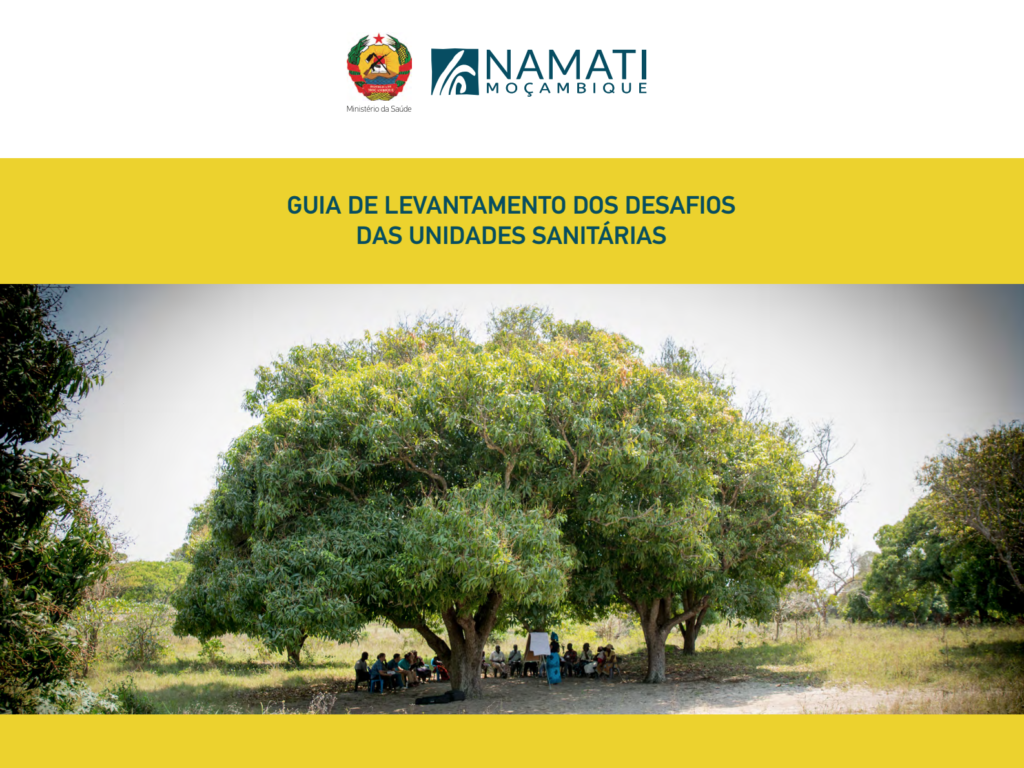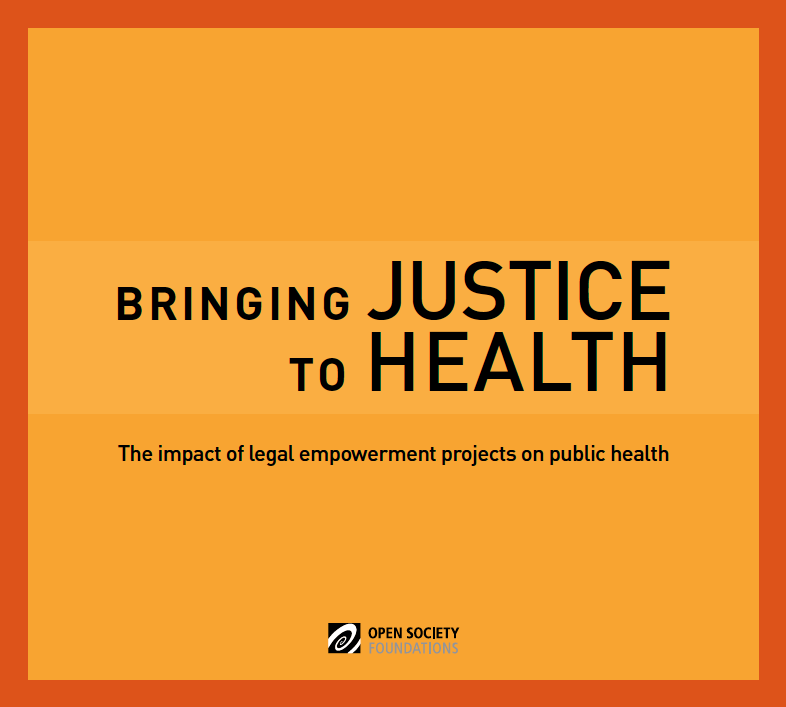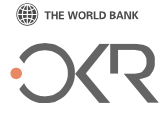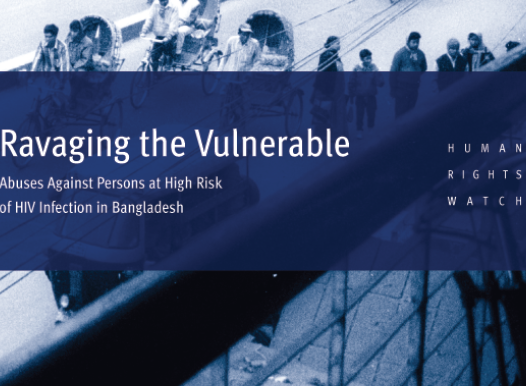The Challenge
Mozambique, like many other countries today, has progressive healthcare policies. But there are massive breakdowns in delivery: in many facilities, patients are treated disrespectfully, essential drugs are missing, or there is no privacy during medical visits.
Poor enforcement, fear, and power inequalities prevent those whose rights have been violated from seeking and receiving redress. These failures are a core reason that Mozambique has some of the worst health outcomes in the world.
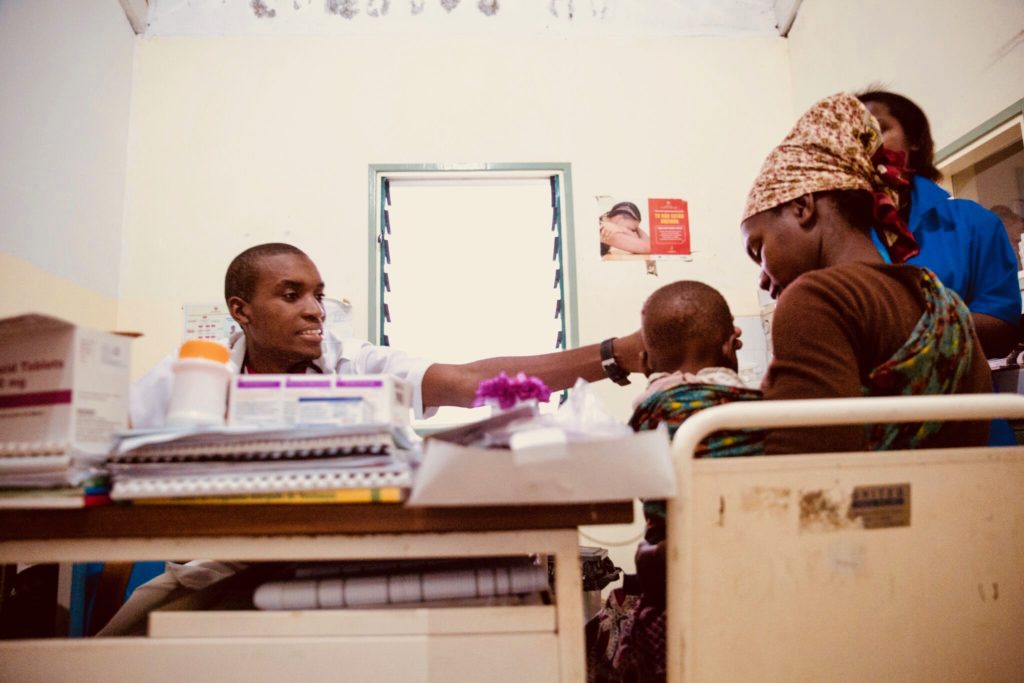
A mother and her child visit with a healthcare worker.
Namati’s Solution
Namati is building a movement of grassroots health advocates to put the power of health policy in people’s hands. Health advocates help bridge the gap between policy and practice by strengthening the accountability of services to poor and vulnerable communities.
They break down policy into simple terms and help people navigate the system, walking alongside patients to overcome the social and structural barriers that undermine human dignity and access to care.
Health advocates engage in three kinds of work:
- increasing awareness of basic rights and health policy,
- facilitating dialogue between communities and health facilities to proactively identify and address violations, and
- pursuing solutions to specific grievances or “cases”.
“In the past, patients in labor who didn’t slip money into their health cards weren’t attended to. They had to give birth alone. But when we went with the health advocate and health committee to sit down with the nurse in charge, and we explained that pregnant women were choosing to give birth at home…[the] head nurse called a meeting and told them this had to stop, and now the midwives no longer demand bribes.”
– 26 year old female patient, Jangamo Health Cente
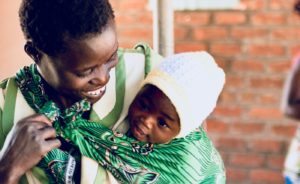
A mother and her baby
Addressing Barriers to Health Care
Since 2013, Namati has helped to resolve over 19,000 grievances in Mozambique.
In partnership with communities and health workers, we’ve addressed complaints related to provider absenteeism, mistreatment and neglect of women during labor, bribery, breaches of confidentiality around HIV testing and clinical consults, lack of information about diagnosis and treatment, misplaced clinical files, and lack of running water and functioning toilets at health facilities.
The majority of these grievances have been collective in nature – affecting anywhere from 10 to 20,000 people. Over the past two years, we’ve seen an average reduction of 43% in these types of violations at facilities with health advocates.
Problems always existed, but no one reported them. …We had complaints registers but the few complaints we received often remained without any response whatsoever. People were afraid to write down ‘Nurse X did such and such.’ But now people’s concerns are heard and the community is finally opening up and talking. With the existence of the health advocate and village health committee they get a prompt response, and the health providers change immediately.
– Maternal and child health nurse, Morrumbene Health Center
Advocating for Systemic Change
Namati tracks data rigorously on every case the advocates take on. In the aggregate, this data provides invaluable insight into how health policy is working in practice. We then draw on this information to advocate for systemic changes that can impact the entire population, not just those living in catchment areas where health advocates are active. The following are a few examples:
- Namati played a key role in writing Mozambique’s National Strategy for the Improvement of Quality and Humanization of Health Care and the country’s first national strategy to combat bribery in the health sector.
- Namati works with village health committees to conduct bi-annual health facility assessments, which gather detailed feedback from communities and health workers and assist them in addressing and monitoring barriers to care. After seeing the impact firsthand, the Ministry of Health (MOH) formally recognized Namati’s approach as part of its national humanization strategy. Aside from supporting the direct implementation of bi-annual assessments in 62 health facilities across 4 provinces, Namati has produced a guide to enable the use of this methodology across the country and is supporting trainings of MOH managers and health committee members even in places where we are not on the ground.
- Namati is supporting the Ministry of Health to create patients’ rights offices at every health facility in Mozambique, including developing a comprehensive training package and operations manual to guide the functioning of these offices.
In January of 2019, Namati established a Center for Training of Paralegals Focused on the Right to Health, through which we will offer tools and support to organizations in Mozambique and beyond.
News & Resources
Os Direitos e Deveres das Pessoas Vivendo com HIV (The Rights and Responsibilities of People Living With HIV)
This brochure educates people living with HIV about their rights (including there rights to non-discrimination, confidentiality and universal anti-retroviral therapy) and their responsibilities, and it provides examples of common barriers to care.
O Direito à Informação na Saúde: O Direito de Pedir e Receber Informação (The Right to Information in the Health Sector)
This brochure educates communities about the type of information that they have a right to receive in relation to health services (hours of operation of health facilities, expected turnaround time for lab tests, and names of health providers, etc.), patient diagnosis and treatment (in relation to lab results, names of ...
Folheto Informativo Sobre Cobranças Ilícitas (Informational Brochure on Bribery in Health Facilities)
This brochure aims to educate communities about bribery in health facilities, including how to identify and report such cases.
O Dever de Assegurar a Privacidade nas Unidades Sanitárias (The Obligation to Ensure Privacy in Health Facilities)
Um folheto para os trabalhadores de saúde que se concentra em estratégias concretas para assegurar a privacidade nas unidades sanitárias. This booklet provides healthcare workers with concrete strategies for ensuring privacy in health facilities.
Manual de Formação de Paralegais, Defensores de Saúde e Agentes Comunitários: Direitos Humanos Para a Saúde e Acesso à Justiça (Training Manual for Paralegals, Health Advocates and Community Workers: Health, Human Rights and Access to Justice)
Este manual apresenta informação que pode ser usada na promoção e defesa do direito a saúde no geral e dos grupos vulneráveis e populações chave em particular. O principal objectivo deste manual é de ser uma ferramenta útil para capacitação inicial dos paralegais, defensores ...
Por Que É Importante a Carga Viral? (Why Is Viral Load Important?)
Este folheto informativo explica a importância da carga viral para pacientes vivendo com HIV, incluindo como manter uma carga viral baixa, quando e como o teste de carga viral deve ser feito e o que significam os resultados do teste. ___ This informational brochure explains the significance of viral load ...
Informação Essencial Sobre Cuidados e Tratamento de HIV & Direitos das PVHIV (Essential Information About HIV Care and Treatment & Rights of People Living with HIV)
Este livrinho fornece aos leitores informações essenciais sobre o HIV; as políticas do Ministério da Saúde de Moçambique em torno do diagnóstico, cuidados e tratamento do HIV; e os direitos e deveres das pessoas vivendo com HIV previstos nas politicas e leis moçambicanas. ...
Acesso à Justiça
As populações chaves e as populações vulneráveis são pessoas ou grupos de pessoas que estão sob risco elevado de exposição ao HIV e violação de outros direitos como o direito à vida, a integridade física, ao trabalho, entre outros, devido ao estigma e ...
Direitos das Pessoas Vivendo com HIV
As pessoas vivendo com HIV/SIDA (PVHIV) vêm muitas vezes os seus direitos humanos violados devido ao estigma e discriminação associado a doença e as barreiras ligadas ao sistema de saúde que incluem, por exemplo, atendimento sem cortesia e falta de confidencialidade e privacidade. Estas violaçõ...
Direitos das Pessoas Afectadas pela Tuberculose
As pessoas afectadas pela tuberculose (TB) vêm muitas vezes os seus direitos humanos violados devido ao estigma e discriminação associado a doença e as barreiras ligadas ao sistema de saúde. As violações dos direitos humanos relacionadas à tuberculose incluem também acesso limitado ao rastreio e ...
Carta dos Direitos e Deveres dos Utentes
A Carta dos Direitos e Deveres do Utente aprovada e adoptada em 2007 pelo Ministério da Saúde (MISAU) reafirma os direitos humanos fundamentais na prestação dos cuidados de saúde e protege a dignidade e integridade humana, bem como o direito à autonomia. É um instrumento através do qual ...
Protecção das Populações Chave – Papel da Polícia e do Paralegal
Esta brochura, elaborada no âmbito da parceria entre a Namati e a FDC, tem como objectivo divulgar os direitos das trabalhadoras de sexo e dos homens que fazem sexo com homens em face da actuação da polícia, no atendimento, nas buscas e na detenção; as violações ...
O Direito à Saúde Manual De Formação Para Moçambique - The Right to Health Training Manual for Mozambique
Este manual é uma ferramenta prática para capacitar as comunidades sobre o significado do direito à saúde e como identificar e liderar em caso de violação destes direitos. O manual foi preparado para ser usado por membros das comunidades, organizações da sociedade civil (GAACs, OCBs, etc.), comités ...
A Practical Guide: Implementing and Scaling Up Programmes to Remove Human Rights Barriers to HIV Services
This guide has been developed to support implementers to plan, roll out and scale up effective, evidence-informed programs to remove human rights-related barriers to HIV services. (A case study about Namati's Right to Health program is found on page 71)
Communities at the Centre: Defending Rights, Breaking Barriers, Reaching People with HIV Services
UNAIDS' Global Update for 2019 takes stock of the state of HIV epidemic around the world, including the advancements that have been made and the challenges that remain. (Namati's Right to Health work is highlighted on pages 134-136).
Transforming Policy into Justice: The Role of Health Advocates in Mozambique
Despite expanding policy commitments in many poor countries, health care is often a failure at the point of delivery. Lack of information, poor enforcement, and power dynamics prevent those whose rights have been violated from pursuing redress. In Mozambique, grassroots health advocates work to address this gap between policy and ...
Recommendations for addressing bribery in the health sector
This guide contains a series of recommendations for both policy and practice focused on the identification, prevention and combat of bribery in the health sector in Mozambique. It is a practical tool that can be used by village health committees, activists, health advocates, community members, health workers, MOH leadership at ...
Guia de Levantamento dos Desafios das Unidades Sanitárias
A ferramenta de levantamento dos desafios das unidades sanitárias (US) visa sistematizar os principais desafios e reclamações sobre qualidade e humanização dos serviços de saúde através da auscultação das comunidades, dos comités de saúde e de co-gestão e humanização, ...
Bringing Justice to Health: The Impact of Legal Empowerment Projects on Public Health
For millions of people around the world, human rights violations are part and parcel of everyday life. Sexual violence, discrimination in housing, unwarranted dismissal from employment, unfair evictions, denial of child support, and police harassment are only a few such violations. These have a particularly harsh impact on people whose ...
Allies Unknown: Legal Empowerment and Social Accountability
Published in the journal Health and Human Rights, this essay suggests that two strands of social action which have hitherto developed separately — legal empowerment and social accountability — ought to learn from one another. Legal empowerment efforts grow out of the tradition of legal aid for the poor; they assist citizens ...
Ravaging the Vulnerable: Abuses Against Persons at High Risk of HIV Infection in Bangladesh
Bangladesh is stoking an emerging AIDS epidemic with violent police abuse of sex workers, injection drug users and men who have sex with men. In this 51-page report, Human Rights Watch documents rapes, gang-rapes, beatings and abductions by both police officers and powerful criminals known as mastans. Their targets — sex ...

